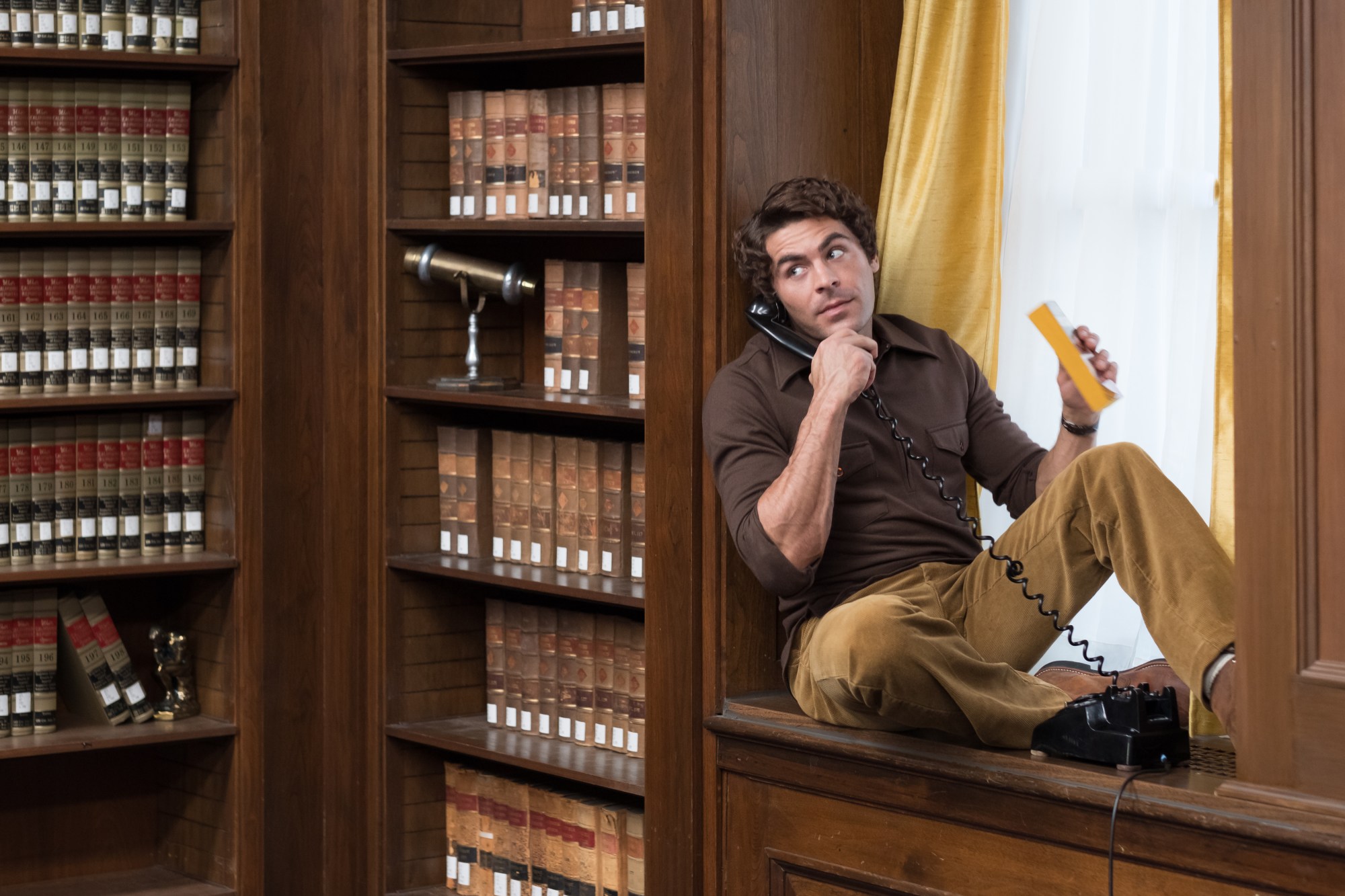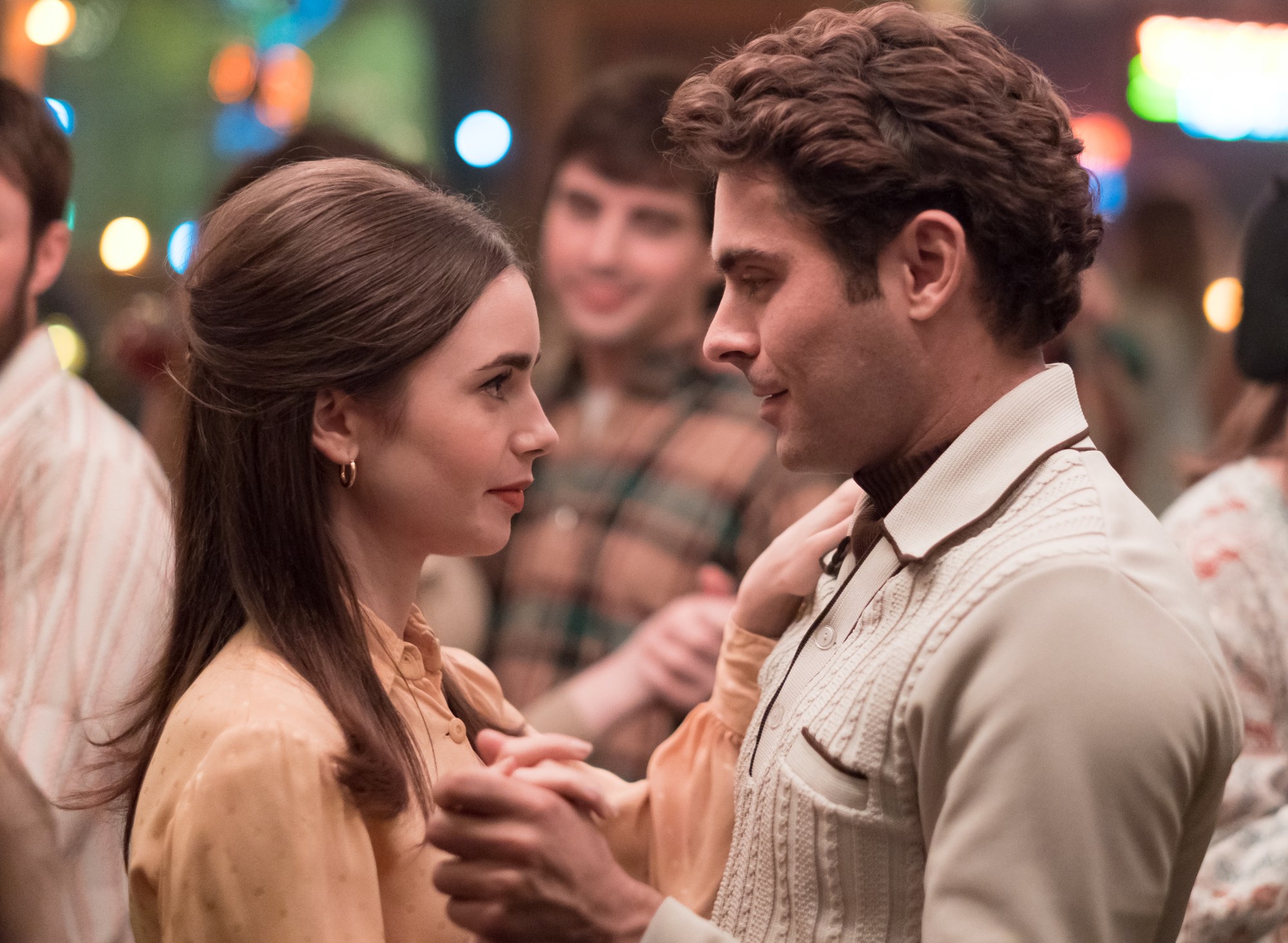There’s a reason people obsessively binged Conversations with a Killer: The Ted Bundy Tapes and it’s not just because the famous murderer was, well, kind of attractive. True crime has fascinated the masses for centuries. In the 1800s, tickets were sold to public executions and souvenirs were available for purchase. This makes the cheering crowds at Bundy’s execution in Florida, some 30 years ago, seem somewhat less absurd. Perhaps our hunger for true crime stems from the fact that we’re wired to look out for danger, so that we don’t become victims ourselves. Or maybe we’re just naturally curious about what happens to our fellow humans. Luckily, for the true crime obsessed, Joe Berlinger has a new movie Extremely Wicked, Shockingly Evil and Vile out today on Netflix. It tells another story of Ted Bundy, the man who has seemingly become America’s favorite serial killer, and through a unique victim’s perspective it portrays the psychology of deception and betrayal.
“Bundy defies all expectations of what we think a serial killer is. We want to think a serial killer is some social misfit…” Berlinger explains. “But Bundy teaches us that the people who often do evil in this world are the people you least expect and most often trust.” His story even makes us question the nature of those we sleep next to at night. In Extremely Wicked, Bundy is played by the very good looking Zac Efron, and the story is told through the eyes of Lily Collins or Liz — his longterm girlfriend who maintained his innocence up until the very end. i-D asked Berlinger all about his two very different Bundy projects, in the hopes that we might gain some insight into why we’re all so obsessed with true crime.

You directed Conversations with a Killer: The Ted Bundy Tapes and Extremely Wicked, Shockingly Evil and Vile . How did you come to work on these two different Ted Bundy projects at the same time?
I wish I could say there was some grand master plan, but a lot of it was just coincidence. In January 2017, [Stephen Michaud] the author of the book “Conversations with a Killer,” which came out years ago, reached out to me and said he was cleaning up and found this box of tapes and hundreds of hours of interviews. He said, ‘Do you think there’s anything there, since everyone seems to love true crime?’ ‘I don’t know,’ was my initial response because a lot had already been done on Bundy. But I listened to the tapes and I found them utterly chilling and terrifying — the clinical detachment, the level of detail. He was speaking in the third person and he doesn’t literally confess, but the content was just so scary, to hear everything from his perspective. I did think there was something there. So, I pitched it to Netflix and they immediately embraced it.
Three months into it. I’d been working on the tapes, listening to the tapes. I was in Los Angeles having lunch with my agent and he said, ‘There is a script that’s kicking around Hollywood that’s called Extremely Wicked. You should read it.” It was a Hollywood blacklisted script. By definition, it was tricky. I was just kind of reading it because I was immersing myself in Bundy. That was really the intent. Flying back to New York from LA, somewhere over Denver, I finished the script and I texted my agent and I said, ‘Oh, my God. Let’s figure out how to do this. I love the point of view.’ Conversations With a Killer is going to be this deep dive into the mind of the killer, but this could be the other half of the coin — the experience of the victim. And we can give the audience the whole perspective of how serial killers like Bundy deceive, manipulate, and pretend to be one thing when they’re another.
And then it all started to come together?
Usually independent films take forever to get off the ground. In my mind, the movie would be two or three years away because it’ll take forever to get the money and the talent. The script, as written, relied upon not knowing it’s Bundy until the very end of the film. You’re reading about this guy named Ted, this woman named Liz, this escalating series of legal entanglements, and this guy is innocent. He’s just caught in the system. It’s impractical because the moment this gets announced, people know it’s a Ted Bundy movie. So, my take wasn’t to avoid that it’s Ted Bundy, but lean into it. Create a performance between the two leads that’s so mesmerizing that the audience suspends the knowledge it’s Bundy and invests in that relationship. So that by the end of the movie, when Liz finally realized the truth, the audience can have the same level of betrayal and disgust that Liz experiences. I literally want the audience to say to themselves, ‘My God, I was actually liking this character for part of the movie and now that I realize what a manipulator and liar he is, I feel disgusted that I liked him halfway through the movie.’
By the end of April 2017, the producer and I had decided let’s do this. Zac Efron’s agent said Zac was looking to do something different. Sometimes it takes actors months to read the script, but he read it immediately. We were totally in alignment about what makes the story great. Zac signed up and within a week after that, the money came. That’s the power of a star. Extremely Wicked got accepted to Sundance… actually, first Netflix decided that January 24 would be the release date for the documentary series because it was the 30th anniversary of Bundy’s execution and I had both the doc series and the movie coming out in the same weekend. Conversations With a Killer was streaming and was extremely popular. For whatever reason, it really hit a nerve.
Well, everyone’s so obsessed with true crime. Why do you think that is?
I think to some extent true crime has never been more popular. But I also think true crime has always been popular. For example, in the 1800s you could buy a ticket to a public execution and they’d sell souvenirs of the criminal being executed. People couldn’t get enough of it, [they] would attend these executions, and buy programs. True crime has always been fascinating to people. What’s changed is the content business. There’s never been more content before. There was no such thing as an unscripted series. A documentary series was unheard of… I think there’s been a growing popularity in true crime as well because we’ve seen the impact that certain documentaries have had on criminal cases. Serial had an amazing impact on that case. My Paradise Lost series got somebody off of death row. Errol Morris’ The Thin Blue Line got somebody off of death row.
That having been said, I do think people are more interested in it than ever before. In part because I think we’re wired for danger, like from the earliest days of being hunter gatherers when you left the cave to go hunt and gather, you might not come back. You were trained to look for danger. I think that’s part of our genetics. I think it’s human nature to be rubberneckers — like when you’re on the highway and traffic slows down because everyone’s looking on the other side of the highway. It’s human nature to want to know what happened to your fellow human being because it grounds you and reminds you, ‘Oh, yes. I’m lucky not to be that person.’ I think that’s human nature.
And serial killers?
I think we are interested in the worst that human beings do because we hope that we don’t become a victim of them. Bundy, in particular, how do you explain the fascination with Bundy himself? It has to do with the fact that Bundy defies all expectations of what we think a serial killer is. We want to think a serial killer is some social misfit who looks and acts a certain way, who is easily identifiable because you can avoid him. But Bundy teaches us that the people who often do evil in this world are the people you least expect and most often trust. Whether it’s a priest who commits pedophilia and holds mass the next day or somebody like Bundy. I think we’re fascinated by somebody who can be so charming and manipulative and believable and sincere that everybody missed the clues for years and that’s why he eluded capture. I think that’s why we’re still fascinated because it means you really don’t know who the person is lying next to you and I think that’s scary.
It is scary! I read an estimate that the average person walks by at least 16 murderers in their lifetime.
Well, the FBI estimates that at any given time, there’s 25 to 50 serial killers actively operating in this country. That’s the other large question we have to ask ourselves: why does the United States, with only five percent of the world’s population, have 67 percent of the world’s documented serial killers?

